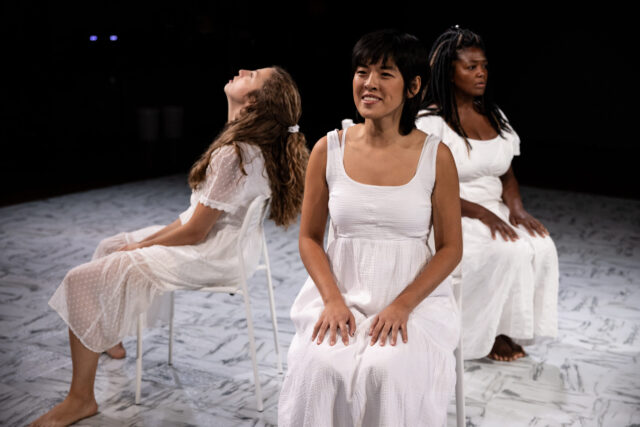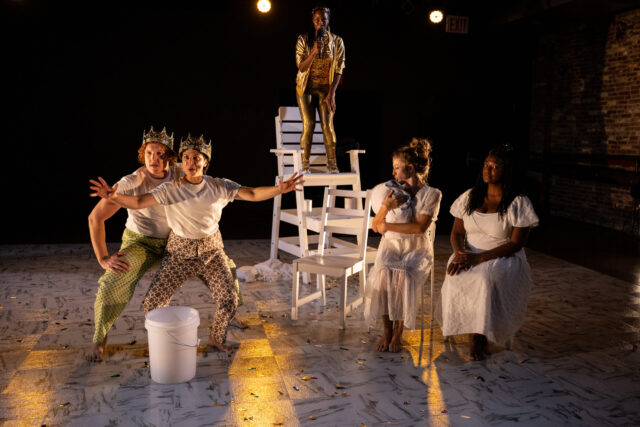
Helen (Lanxing Fu) sits with her sisters, Klaitemestra (Grace Bernardo) and Timandra (Melissa Coleman-Reed), in new retelling at La MaMa (photo by Maria Baranova)
HELEN.
La MaMa Downstairs
66 East Fourth St. between Second Ave. & Bowery
Wednesday – Sunday through October 29, $25-$30
212-475-7710
www.lamama.org
A period is part of the title of Caitlin George’s Helen., emphasizing the role of menstruation and reproductive capability in women’s lives. In fact, in the script, Helen is identified as “Period,” as if that’s what defines her, and all women. In the show, a feminist reimagining of the story of Helen of Troy — which has been told by Homer, Virgil, Aristophanes, Euripides, and others — the title character (Lanxing Fu) spends ninety minutes literally and figuratively running away from her responsibilities as a wife and mother, tossing aside her white classical gown in favor of a tight-fitting white sports bra and shorts. The war she is fighting is not against the Achaeans but against the patriarchy.
The feminist reimagining, which opened Monday night at La MaMa Downstairs, begins with Eris (Constance Strickland), the Goddess of Discord, explaining, “Khaos is not a gentle endeavour. I wear her like silk.” The show itself is chaotic, unable to find its center, caught in a whirlpool of its own making. Sitting in a white lifeguard chair and wearing a tight-fitting glittering gold lame outfit, Eris keeps a close watch on the proceedings, occasionally speaking into a microphone and descending to the floor, part narrator, part emcee.
The narrative focuses on motherhood and gender expectations, as well as concepts of beauty and love, in the oft-told story of Helen (Lanxing Fu), her sisters Klaitemestra (Grace Bernardo) and Timandra (Melissa Coleman-Reed), her husband Menelaus (Jackie Rivera), her lover-abductors Paris (Jonathan Taikina Taylor) and Hektor (Rivera), her brother-in-law Agamemnon (Taylor), and her daughter, Hermione (Jessica Frey). Helen is distraught when she loses a button, a symbol that her life as she knew it is about to become undone. The siblings are in mourning for their mother; while Helen feels that something has changed, the pregnant Klaitemestra and Timandra are prepared for what comes next: laundry, shopping, cleaning the kitchen.

Helen. offers a unique reimagining of the story of Helen of Troy (photo by Maria Baranova)
Helen declares that she’s bored. “I want to be doing something. . . . I want to go on an adventure. I can’t stay here. I can’t.” And off she goes, as her sisters wonder how she could abandon her child, and the men in her life act as if they themselves are goofy children playing a game. She races around the stage, behind the audience, and through the lobby, emerging on the other side, stopping to contemplate her past and future. Time becomes an anomaly, blurring the story, making it hard to follow when she meets up with people on her journey again and again, running in circles, amid references to Tupperware, a slow cooker, phone calls, and MILFs.
“Keep in mind that time is not a matter of straight lines,” Eris attempts to explain. “Time is loops, it’s globs and eternities that spiral into out of around what might have come after before. It builds behind, swirls around, we drag it with us as it accumulates; rising from ankles to throat till it bursts. Time moves but not in lines. Those are only written in afterwards to fence the monsters out.”
Presented in association with En Garde Arts and performed by the SuperGeographics, Helen. has a unique charm that it’s often unable to sustain. Repetition abounds, along with confusion. Director Violeta Picayo seems to revel in the mayhem on James Schuette’s odd set, in which chairs and other objects are moved about randomly, brought together and then taken apart. Schuette also designed the costumes, which would feel right at home in a Comic Con cosplay contest. The young cast is eager and likable, led by Fu and Coleman-Reed, but all the characters eventually stagnate.
George divides the play into five sections: “Death (Away),” “Marriage,” “Birth,” “The Forgotten,” and “Death (Toward).” Each one has its moments, but as a unit, they spiral too much out of control.
[Mark Rifkin is a Brooklyn-born, Manhattan-based writer and editor; you can follow him on Substack here.]